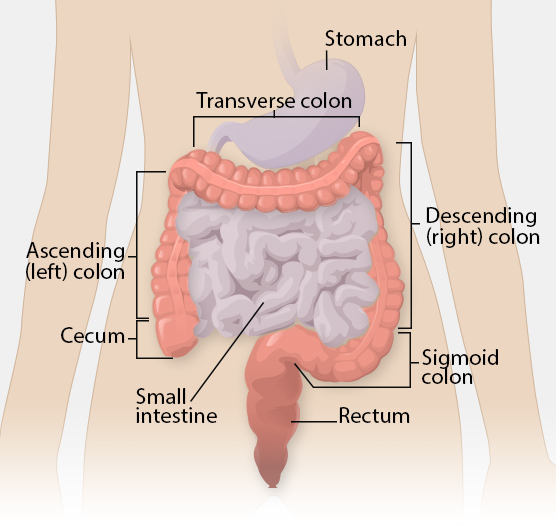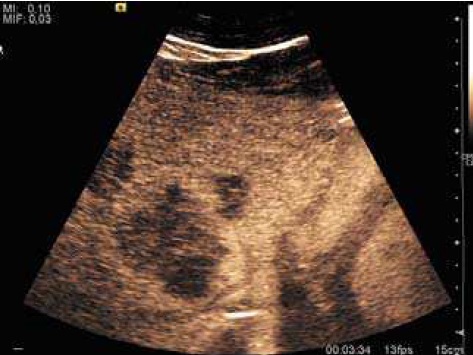What is Colon cancer?
Colon cancer may be a sort of cancer that starts within the intestine (colon). The colon is the final part of the digestive tract.Colon cancer typically affects older adults, though it can happen at any age. t usually Starts as small, noncancerous (benign) clumps of cells called polyps that form on the within of the colon. Over time a number of these polyps can become colon cancers.Polyps could also be small and produce few if any, symptoms. For this reason, doctors recommend regular screening tests to assist prevent colon cancer by identifying and removing polyps before they become cancer. If colon cancer develops, many treatments are available to assist control it, including surgery, radiotherapy, and drug treatments, like chemotherapy, targeted therapy, and immunotherapy. Colon cancer is usually called colorectal cancer, which may be a term that mixes colon cancer and rectal cancer, which Starts within the rectum.
Symptoms
Signs and symptoms of colon cancer include:
- A persistent change in your bowel habits, including diarrhea or constipation or a change within the consistency of your stool
- Rectal bleeding or blood in your stool
- Persistent abdominal discomfort, like cramps, gas, or pain
- A feeling that your bowel doesn't empty completely
- Weakness or fatigue
- Unexplained weight loss
Many people with colon cancer experience no symptoms within the early stages of the disease. When symptoms appear, they'll likely vary, counting on cancer's size and site in your intestine.

Causes
Doctors aren't certain what cause most colon cancers. In general, colon cancer starts when healthy cells within the colon develop changes (mutations) in their DNA. A cell's DNA contains a group of instructions that tell a cell what to do. Healthy cells grow and divide in an orderly thanks to keeping your body functioning normally. But when a cell's DNA is broken and becomes cancerous, cells still divide — even when new cells aren't needed. Because the cells accumulate, they form a tumor. With time, the cancer cells can grow to invade and destroy normal tissue nearby. And cancerous cells can visit other parts of the body to make deposits there (metastasis).
Risk factors
Factors that will increase your risk of colon cancer include:
- Older age. Colon cancer is often diagnosed at any age, but a majority of individuals with colon cancer are older than 50. The rates of colon cancer in people younger than 50 are increasing, but doctors aren't sure why
- African-American race. African-Americans have a greater risk of colon cancer than do people of other races.
- A personal history of colorectal cancer or polyps. If you've already had colon cancer or noncancerous colon polyps, you've got a greater risk of colon cancer within the future.
- Inflammatory intestinal conditions. Chronic inflammatory diseases of the colon, like ulcerative colitis and Crohn's disease can increase your risk of colon cancer.
- Family history of colon cancer. You're more likely to develop colon cancer if you've got a blood relative who has had the disease. If quite one loved one has colon cancer or rectal cancer, your risk is even greater.
- Low-fiber, high-fat diet. Colon cancer and rectal cancer could also be related to a typical Western diet, which is low in fiber and high in fat and calories. Research during this area has had mixed results. Some studies have found an increased risk of colon cancer in people that eat diets high in meat and processed meat.
- A sedentary lifestyle. People that are inactive are more likely to develop colon cancer. Getting regular physical activity may reduce your risk of colon cancer.
- Diabetes. People with diabetes or insulin resistance have an increased risk of colon cancer.
- Obesity. People that are obese have an increased risk of colon cancer and an increased risk of dying of colon cancer in comparison with people considered normal weight.
- Smoking. People that smoke may have an increased risk of carcinoma.
- Alcohol. Heavy use of alcohol increases your risk of carcinoma.
- Radiation therapy for cancer. Radiotherapy directed at the abdomen to treat previous cancers increases the danger of colon cancer.

Prevention
Screening colon cancer Doctors recommend that folks with a mean risk of carcinoma consider colon cancer screening around age 50. But people with an increased risk, like those with a case history of colon cancer, should consider screening sooner. Several screening options exist — each with its own benefits and disadvantages. Mention your options together with your doctor, and together you'll decide which tests are appropriate for you. Lifestyle changes to scale back your risk of colon cancer You can take steps to scale back your risk of colon cancer by making changes in your lifestyle. Take steps to:
- Eat a spread of fruits, vegetables, and whole grains. Fruits, vegetables, and whole grains contain vitamins, minerals, fiber, and antioxidants, which can play a task in cancer prevention. Choose a spread of fruits and vegetables in order that you get an array of vitamins and nutrients.
- Drink alcohol carefully, if at all. If you select to drink alcohol, limit the quantity of alcohol you drink to no quite one drink each day for ladies and two for men.
- Stop smoking. Ask your doctor about ways to quit which will work for you.
- Exercise most days of the week. Attempt to get a minimum of half-hour of exercise on most days. If you have been inactive, start slowly and build up gradually to half-hour. Also, ask your doctor before starting any exercise program.
- Maintain a healthy weight. If you're at a healthy weight, work to take care of your weight by combining a healthy diet with daily exercise. If you would like to reduce, ask your doctor about healthy ways to realize your goal. Aim to reduce slowly by increasing the quantity of exercise you get and reducing the number of calories you eat.
Colon cancer prevention for people with a high risk Some medications are found to scale back the danger of precancerous polyps or colon cancer. As an example, some evidence links a reduced risk of polyps and colon cancer to regular use of aspirin or aspirin-like drugs. But it isn't clear what dose and what length of your time would be needed to reduce the risk of colon cancer. Taking aspirin daily has some risks, including gastrointestinal bleeding and ulcers. These options are generally reserved for people with a high risk of colon cancer. There’s not enough evidence to recommend these medications to people that have a mean risk of colon cancer. If you've got an increased risk of colon cancer, discuss your risk factors together with your doctor to work out whether preventive medications are safe for you.
